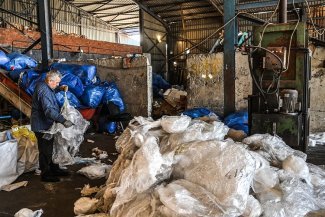The Syncrude refinery (19 June 2019), north of Fort McMurray, produces crude oil from tar sands, which account for 98 per cent of Canada’s proven oil reserves.
With just months to go before Canada’s federal elections, tensions are growing around the Trans Mountain Expansion Project (TMX), which plans to triple the amount of tar sands oil transported via the highly controversial pipeline from Edmonton, in Alberta, to Vancouver, in British Columbia, in western Canada.
The federal government, based in Ottawa, gave the project the green light on 18 June 2019, to the delight of the governor of Alberta, an oil-producing province looking for new openings. However, the provincial government of British Columbia, most of the First Nations and numerous environmental organisations are firmly opposed to the project and are highlighting the ecological risks, the impact on global warming and the real cost of the TMX.
“Following the decision taken by Prime Minister Justin Trudeau, a huge coalition was formed on the west coast, bringing together citizens, landowners, unions such as the BC Teachers’ Federation or the British Columbia Government and Service Employees’ Union (BCGEU), environmental organisations and over 150 First Nations from Canada and the United States. And more legal challenges are set to come, as the First Nations have not given their ‘free and informed’ consent, as stipulated by the United Nations. There have been consultations, it’s true, but not the agreement of the majority […]. We are expecting a groundswell of opposition based on the economic stakes and the impact on tourism and the First Nations’ ways of life. People, young and old, and political leaders are ready to stand in the way of the bulldozers,” Patrick Bonin, energy and climate campaign coordinator at Greenpeace Canada, tells Equal Times.
According to the Canadian Environmental Assessment Agency, the Trans Mountain Expansion Project – which will add 590,000 barrels of oil a day to the pipeline system’s capacity, taking it up to 900,000 barrels a day – could increase upstream greenhouse gas emissions by an estimated 13 to 15 million tonnes of carbon dioxide a year.
It will also mean a sevenfold increase in cargo ship traffic in Vancouver Bay, posing a threat to local ecosystems, marine life, tourism revenues and the health of people living in British Columbia.
The pipeline, which cuts through First Nation lands, is also seen as an attack on the ways of life and the rights of indigenous peoples, for whom water, land and forests are sacred. Tar sands are among the dirtiest and the most polluting sources of oil on the planet. In Canada, they represent 98 per cent of the country’s proven oil reserves. According to the Environment Ministry, the oil province of Alberta alone is responsible for 37 per cent of the country’s greenhouse gas emissions.
“The Trans Mountain is not only an indigenous issue. If the project goes ahead, it will have an impact on the entire ecosystem of British Columbia and its economy, which relies on tourism and the almost C$8 billion a year it generates […]. There is no real benefit for British Columbia. So why should we take such a risk, when an accident could affect our environment for several generations?” asks Grand Chief Stewart Phillip, of the Union of British Columbian Indian Chiefs (UBCIC), during an interview with Equal Times. The First Nations leader is firmly opposed to the project but confident in the validity and the certain victory of the cause.
“We are told that the oil will be sold to Asia. But that’s outrageous. It is dirty oil that not everyone has the capability to refine. It is highly corrosive. Why would Asia buy that kind of oil when there are so many other kinds available that wouldn’t damage their refineries?” he adds.
Kinder Morgan, the US company initially heading the project, came up against so much resistance and so many legal challenges that it had to throw in the towel. Trudeau’s government came to the rescue, in August 2018, buying the Trans Mountain pipeline and expansion project for C$4.5 billion (around US$3 billion). But the bill is considerably higher today. And the potential economic benefits for Canada are open to question.
According to the Canadian think-tank Conference Board of Canada, by opening access to global markets the Trans Mountain project could generate economic returns of C$46.7 billion over 20 years (US$35.8 billion) for the federal and provincial governments (taxes and duties), whilst the oil companies could see their income increase by C$73.5 billion over the same period (US$56.4). These highly contested benefits do not, however, take into account the project’s negative effects, nor its real cost, now estimated at close to C$9.5 billion (US$7.3 billion), nor the fact that Canada is warming at more than double the global rate.
“There are no thorough and independent studies on this project. The two studies conducted by Scotiabank and the Conference Board of Canada, a traditionally pro-oil organisation, have hugely inflated the economic benefits. When the government talks of billions of dollars in benefits, it is not credible, there is no proof of that. The number of jobs it is expected to create is also exaggerated. The only reliable figures are those initially supplied by Kinder Morgan to the National Energy Board (NEB), indicating that the project would create 2500 jobs a year over two years during the construction phase, and 40 permanent jobs in British Columbia and 50 in Alberta,” says Ricardo Acuña, director of the research body Parkland Institute, based in Edmonton, Alberta.
Moving away from its climate targets
The Trans Mountain Expansion Project has placed Canada face to face with its contradictions and leaves it with a very difficult equation to solve. How can it reconcile the expansion of the pipeline system with its international climate commitments to limit greenhouse gas emissions?
Canada has signed the Paris Climate Agreement and has pledged to work towards keeping temperature rises to well below 2°C. Prime Minister Justin Trudeau seems to have parried the question by announcing that every dollar the federal government earns from this project will be invested in Canada’s clean energy transition.
The idea of funding the green transition by increasing the extraction of oil from highly polluting tar sands is not without its irony. “From a climate change perspective, expanding the Trans Mountain pipeline system is a step backward and places Vancouver at serious risk,” Doug Smith, director of sustainability for the City of Vancouver, tells Equal Times.
“Increasing oil production in Alberta, thanks to the TMX, risks increasing emissions by 42 per cent, which means that the rest of the country will have to reduce emissions by the same amount by 2030, and that’s impossible. So, engaging in the project means completely disregarding the commitments we have undertaken within the framework of the Paris Agreement,” says Acuña.
For Alberta, the more time goes by, the more it will cost to withdraw from tar sands and start a real energy transition, and the more difficult the change will be. The Communications, Energy and Paperworkers Union of Canada (CEP), now UNIFOR, was already advocating a fair transition plan for energy sector workers back in 2008, calling for strong public intervention and funding commensurate with the scale of the challenge at hand. Unifor, Canada’s largest energy sector union, with almost 12,000 members, is now calling for energy diversification in Alberta, and an upgrade of its existing resources, by increasing local refining capacities.
Oil workers in Fort McMurray can earn around C$100,000 a year, three times the amount earned in other parts of the country. They are wary of change. What assurances do they have that they will be able to keep paying the bills and providing for their families?
“The transition means we have to create new jobs, train people and ensure new sources of revenue for the provincial government of Alberta. The time already lost has led us into a situation whereby the investments now needed are huge and have to be made within a very short space of time,” says Acuña. Tackling it will require some courageous measures from Canada’s next government.










